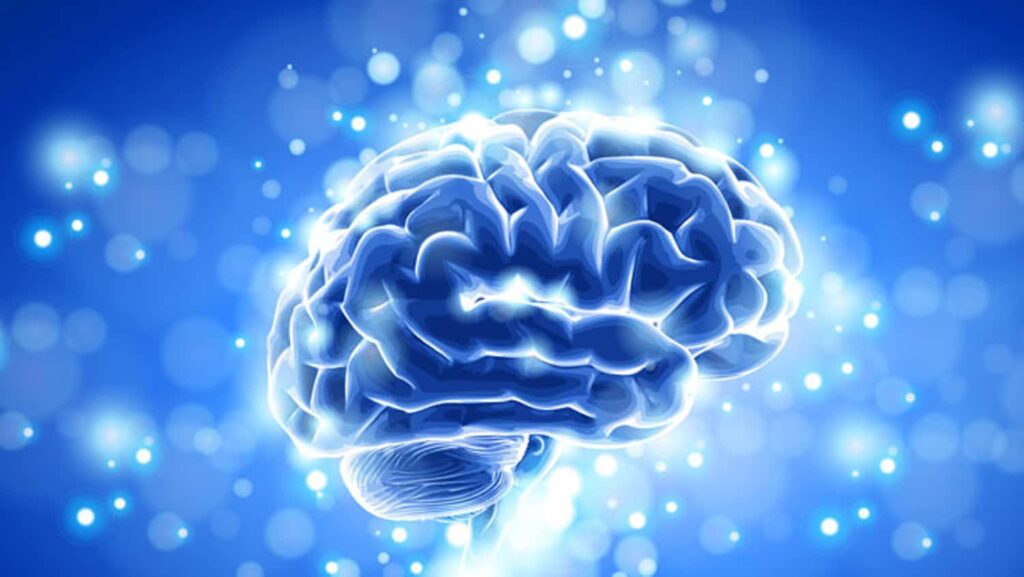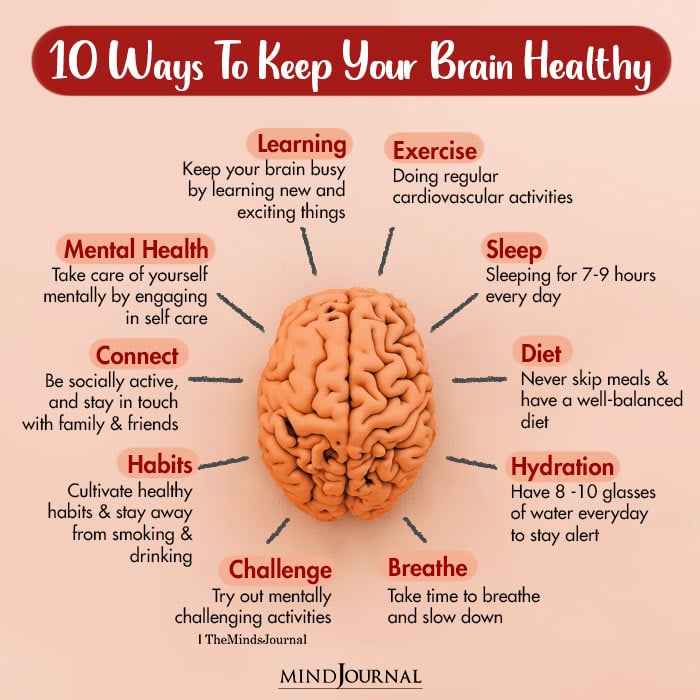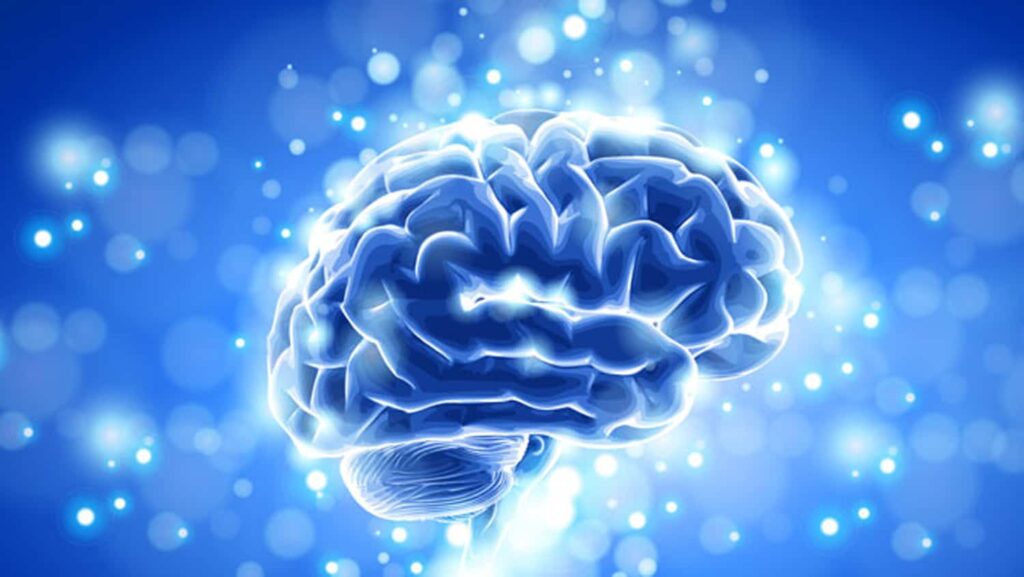
Brain health refers to the efficient functioning of the brain across thinking, emotional, sensory, and behavioral areas, enabling learning, decision-making, and adaptability throughout life. It safeguards memory, mood, and disease resistance, forming the foundation of overall well-being.
Key Takeaways
- Regular physical activity promotes neurogenesis and reduces dementia risk.
- A brain-healthy diet (MIND diet) supports memory and delays cognitive decline.
- Quality sleep removes toxins and enhances focus and learning.
- Mental and social engagement maintain neuroplasticity and resilience.
- Managing stress and cardiovascular health protects brain structure and function.
- Avoiding smoking, alcohol abuse, and head injuries prevents long-term cognitive damage.
Understanding Brain Health
Brain health refers to the optimal functioning of the brain across cognitive, sensory, emotional, behavioral, and motor domains. It allows individuals to realize their potential, adapt to challenges, and lead a fulfilling life, irrespective of age or the presence of disorders. A healthy brain is resilient, adaptable, and crucial for optimal performance in daily activities.
Why Does Brain Health Matter?
Brain health is essential because the brain controls nearly every aspect of our lives, from how we think and feel to how we move and interact with others. Maintaining brain health ensures we can function well, adapt to changes, and protect ourselves against cognitive decline and neurological diseases.
- Cognitive Function: Involves memory, attention, problem-solving, learning, and decision-making. A healthy brain processes information quickly, remembers details, and adapts to new situations.
- Emotional Regulation: The brain helps manage feelings, control reactions, and cope with stress or setbacks. Stable brain function means fewer mood swings and better handling of emotions.
- Sensory Processing: The brain receives and interprets information from senses (sight, sound, touch, taste, smell). Healthy processing allows accurate understanding of the environment.
- Motor Skills: The brain directs movement and coordination. Good brain health allows precise, balanced movements and physical activities.
- Behavior Control: The brain influences self-control, habits, motivation, and social interactions. Healthy function supports appropriate responses and goal-directed actions.
- Disease Resistance: A healthy brain is less likely to develop conditions like Alzheimer’s, dementia, stroke, or Parkinson’s. It also helps slow the progression if these conditions develop.
Natural Tips to keep your brain healthy
Taking care of your brain is one of the wisest health decisions you can make, especially as you get older. Modern studies and clinical trials show that simple, practical steps can protect your memory, reasoning, and even your mood.

- Stay Physically Active
Exercise increases blood supply to the brain and supports the growth of new neurons (neurogenesis). Activities like walking, cycling, swimming, or tai chi stimulate the hippocampus and prefrontal cortex, which handle memory and planning. The Alzheimer’s Research & Prevention Foundation and the FINGER trial show that regular physical activity lowers cognitive impairment risk. The guideline is 150 minutes per week of moderate-intensity movement. You can divide this into sessions that fit your schedule.
| Type of Exercise | Brain Benefit | Practical Advice |
| Aerobic (walking, cycling) | Boosts blood flow, supports new brain cell growth | Aim for 30 minutes, 5 days/week |
| Coordination-based (dance, tai chi) | Improves balance, strengthens memory circuits | Join a group or class |
| Resistance (weights) | Builds resilience against decline | Light weights, 2x weekly |
- Goal: 150 minutes of moderate (brisk walking, swimming) or 75 minutes of vigorous activity (fast cycling) weekly.
Tip: Start slow, increase intensity gradually, and consult a healthcare provider before new regimens, especially if you have underlying health issues.
- Eat for Brain Health
Diet directly influences brain aging. The MIND diet, including leafy greens, berries, whole grains, fish, nuts, beans, and olive oil, slows memory loss and lowers Alzheimer’s risk by 53 percent (Morris et al., 2015). Avoid trans fats, processed sugars, and highly processed snacks because they increase inflammation and oxidative stress, which contribute to cognitive decline. To know more about food to eat for Brain Health Click Here.
| Eat More | Limit or Avoid |
| Leafy greens and berries | Fried, sugary, packaged foods |
| Fish, nuts, olive oil | White bread, sodas |
| Beans, whole grains | Red meat (limit) |
- Nutrients to focus on: Omega-3s (fish, flaxseed), antioxidants (berries, leafy greens), polyphenols (dark chocolate, coffee), magnesium (beans, nuts).
- Foods that cloud thinking: Fried foods, baked goods with white flour, candy, and high-sugar cereals.
Tip: Eat a variety of colors and flavors nature’s way of signaling nutrient richness that supports sharp thinking and focus.
- Sleep & Circadian Health
Sleep acts as a cleanup crew for the brain at night, clearing waste that can build up and harm memory or thinking. A study in the journal Science found consistent, quality sleep helps the brain remove toxins linked to Alzheimer’s. Adults should aim for 7–9 hours each night, sticking to a regular schedule.
- Expose yourself to natural light in the morning.
- Establish an evening routine (reading, gentle music).
- Limit electronic screens 1 hour before bed.
- Watch for sleep problems, such as waking up often or feeling unrefreshed; these may be signs of apnea or insomnia, which both raise risk for cognitive impairment.
- Mental & Cognitive Stimulation
Just as the body needs exercise, the brain does too. Activities that challenge the mind like learning a new language, playing an instrument, or solving puzzles stimulate the brain’s ability to adapt and grow new connections. This is known as neuroplasticity.
- Active vs. Passive: Reading, conversation, and games like chess challenge your thinking more than watching television.
- Brain-training apps: Some studies suggest modest benefits for processing speed, but real-world activities often give the best results.
- Creative pursuits: Art, music, writing, and crafts all build neural connections and may delay cognitive aging.
- Stress Management & Mindfulness
Long-term stress can release high levels of cortisol that shrink key memory areas in the brain, notably the hippocampus. Mindfulness practices, including meditation and deep breathing, have been shown in Harvard and UCLA studies to counteract these effects, lowering stress and even increasing gray matter density.
- Everyday stress relief: Try daily meditations, guided breathing, short mindfulness walks.
- Journaling and gratitude: Keeping a short gratitude journal recalibrates your brain’s emotional circuits, promoting optimism and calm.
- Disease risk: Chronic stress is linked to higher rates of dementia and other neurodegenerative illnesses.
- Social Connection & Emotional Health
Staying engaged with others doesn’t just lift the spirit, it keeps the brain healthy, too. Research from the Rush Memory and Aging Project showed that frequent social activity slowed cognitive decline by up to 70% in older adults.
- Effects of isolation: Loneliness is linked with more inflammation and faster brain shrinkage.
- Building connection: Regular visits with family, volunteering, and group activities (book clubs, choirs, classes) strengthen your sense of purpose and support brain health.
- Emotional regulation: Sharing feelings and managing conflict are protective, too, people who consistently connect and communicate show stronger mental resilience.
- Cardiovascular & Metabolic Health
What is good for the heart is good for the brain. Problems like uncontrolled high blood pressure, diabetes, and unhealthy cholesterol can damage the blood vessels that supply the brain, increasing the risk for stroke and dementia.
- Lifestyle: Don’t smoke, limit alcohol, get regular blood pressure and cholesterol checks.
- Hearing and vision: Untreated hearing loss and eye disease can speed up memory problems, so routine screening is vital.
- Screening: Ask your doctor about regular metabolic and vascular checks.
- Emerging Tools & Supplement Caution
There are many new methods for tracking and supporting brain health. Some, like brain health scoring frameworks (assessments from major clinics and research groups), are helpful for monitoring change over time.
- Supplements: Most over-the-counter supplements like ginkgo or phosphatidylserine lack strong proof and can interact dangerously with other medications.
- Promising natural herbs: Small studies suggest sage, bacopa, and lion’s mane mushroom may help memory, but research is ongoing.
- Priority: Always consult a physician before starting new supplements, especially in older age.
- Structured Lifestyle Plan
Major studies including the FINGER trial (Finland) and U.S. POINTER study proves that combining exercise, diet, learning, and social connection can slow cognitive decline significantly among older adults at risk for dementia.
| Weekly Planner Example | Daily Goal |
| Exercise | Walk 30 minutes, 5 days |
| Nutrition | Leafy greens 6x/wk, fish 2x/wk, nuts daily |
| Sleep | Bedtime routine, same time nightly |
| Mental challenge | Puzzles, reading, group activity |
| Social interaction | Call a friend, join a club, volunteer |
Key Factors Affecting Brain Health
Several key factors affect brain health, influencing your risk for cognitive decline, memory loss, and brain diseases over time. The most influential factors are:
- Cardiovascular Health: High blood pressure, high cholesterol, high blood sugar, and poor heart health all damage blood vessels in the brain, increasing your risk for stroke and dementia. Maintaining healthy blood pressure, cholesterol, and glucose levels is vital.
- Lifestyle Choices: Smoking and excessive alcohol use shrink brain tissue and disrupt brain circuits needed for thinking and mood. Physical inactivity reduces blood flow to the brain, compounding the risk for cognitive decline. A poor diet, especially one high in processed foods and unhealthy fats, deprives the brain of needed nutrients and antioxidants.
- Body Weight: Obesity, especially in midlife, raises inflammation and increases the risk for cognitive impairment. Maintaining a healthy weight through diet and exercise is protective.
- Sleep Quality: Chronic sleep problems and disorders such as insomnia or sleep apnea disrupt the brain’s repair cycles, affecting memory and increasing long-term risk for mood disorders and cognitive decline.
- Mental and Social Stimulation: Engaging in regular social interaction, learning, and mental challenges supports neuroplasticity, the brain’s ability to form new connections and helps protect cognition as you age.
- Chronic Medical Conditions: Conditions like diabetes, depression, and kidney disease harm blood vessels and brain structure, accelerating decline if not managed properly.
- Protection Against Injury: Head injuries from falls, accidents, or sports can cause long-term damage and increase the risk of dementia. Taking steps to prevent head trauma, including wearing seat belts and helmets is important.
- Socioeconomic and Environmental Factors: Lower levels of education, limited access to healthcare, persistent stress, and exposure to environmental toxins (air pollution, chemicals) all negatively influence brain health over time.
Do and Don’ts for brain health
Maintaining a healthy brain is vital for independence and active living as we age. The brain controls memory, thinking, and emotions. Research shows that habits like regular exercise, balanced nutrition, quality sleep, mental activity, and social connection support brain health and lower cognitive decline risk.
| Do’s for Brain Health | Don’ts for Brain Health |
| Engage in regular physical activity (walking, cycling, tai chi) | Live a sedentary lifestyle |
| Follow a brain-healthy diet: leafy greens, berries, nuts, fish | Eat trans fats, refined sugars, or highly processed foods |
| Maintain consistent, quality sleep (7–9 hours nightly) | Ignore persistent sleep issues or disrupt sleep schedule |
| Challenge your mind with learning and problem-solving | Stick to passive activities (e.g., hours of television daily) |
| Practice stress reduction (meditation, breathwork, gratitude) | Allow chronic stress and anxiety to go unmanaged |
| Stay socially active with family, friends, community groups | Isolate yourself or withdraw from social contacts |
| Have regular health checks (blood pressure, glucose, cholesterol) | Neglect treatment of hypertension, diabetes, or cholesterol |
| Correct vision/hearing loss promptly | Ignore eye and hearing problems |
| Use seatbelts, helmets, and prevent falls at home | Take risks with personal safety or ignore head protection |
| Quit smoking and limit or avoid alcohol | Smoke cigarettes or drink alcohol excessively |
| Consult a doctor before taking supplements | Self-medicate with unproven or risky supplements |
| Keep learning through reading, hobbies, or new skills | Avoid new experiences or stop education |
Conclusion
Maintaining brain health is crucial for preserving memory, cognition, and independence as we age. Research shows that regular physical activity, a balanced diet rich in antioxidants and healthy fats, quality sleep, mental stimulation, stress management, social engagement, cardiovascular and metabolic health control, injury prevention, and avoiding harmful substances form the foundation of cognitive resilience. Combining these evidence-based habits can slow cognitive decline and reduce dementia risk, making consistent lifestyle choices essential at any age for sustaining mental clarity and overall well-being.
FAQs
What exercises are best for boosting memory and focus?
Aerobic activities like brisk walking and cycling support memory, while coordination exercises like dance or tai chi sharpen focus.
Can dietary changes really prevent cognitive decline?
Studies show diets rich in leafy greens, berries, nuts, and fish can lower Alzheimer’s risk by over 50%.
How does sleep affect memory and brain detox?
Sleep is vital for memory and removes brain waste linked to cognitive decline.
What role does meditation play in protecting brain function?
Mindfulness and meditation lower stress, which protects memory centers and may even increase brain matter.
Are brain-training apps scientifically effective?
They offer small improvements, but regular learning, crafts, or group games provide more lasting brain benefits.
How do social relationships influence cognitive health?
Frequent, meaningful social interaction slows cognitive decline and helps maintain independence.
Is it too late to start protecting brain health in your 50s or 60s?
Research proves you can benefit at any age starting now makes a real difference.
Which supplements are actually harmful to brain health?
Some, like high-dose Vitamin E or poorly regulated herbal pills, may interact with medications; always check with your doctor.
How does chronic stress rewire the brain?
Long-term stress shrinks memory regions and impairs learning, making stress management critical.
Are there medical tests to assess my brain health status?
Yes, clinicians can use questionnaires, memory tests, and scans to check cognitive health and track change over time.
Reference
- FINGER Trial (Finnish Geriatric Intervention Study to Prevent Cognitive Impairment and Disability):
https://www.thelancet.com/journals/lancet/article/PIIS0140-6736(15)60461-5/fulltext - MIND Diet research (Rush University Medical Center):
https://www.rush.edu/news/20150401/rush-study-mind-diet-may-slow-cognitive-decline - Sleep and brain waste clearance (Science journal, Xie et al., 2013):
https://www.science.org/doi/10.1126/science.1241224 - Harvard Medical School – Mindfulness and stress reduction benefits:
https://www.health.harvard.edu/mind-and-mood/mindfulness-meditation-reduces-stress - Rush Memory and Aging Project:
https://www.rush.edu/health-wellness/professional-education/research/aging-memory-and-cognitive-health - Alzheimer’s Association – Brain-Healthy Lifestyle Tips:
https://www.alz.org/alzheimers-dementia/research_progress/prevention - ACTIVE Study (Advanced Cognitive Training for Independent and Vital Elderly):
https://jamanetwork.com/journals/jama/fullarticle/198637 - Mayo Clinic – Brain Health Overview:
https://www.mayoclinic.org/healthy-lifestyle/adult-health/in-depth/brain-health/art-20481054 - Alzheimer’s Research & Prevention Foundation – Physical Activity Benefits:
https://www.alzheimersprevention.org/exercise-and-brain-health/
Dr. Nathan Cole, MD, PhD, is a neurologist and cognitive health researcher with 13 years of experience in brain aging, neuroprotection, and nutritional neuroscience. He earned his MD and PhD in Neuroscience from Harvard Medical School and completed residency at Mass General Brigham. Dr. Cole focuses on cognitive enhancement through diet, lifestyle, and targeted supplementation. His recent work includes clinical trials on omega-3 and polyphenol support for memory and focus in aging adults.


